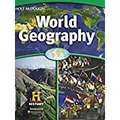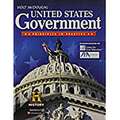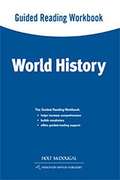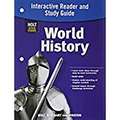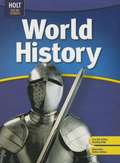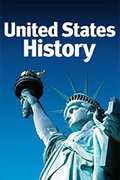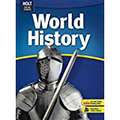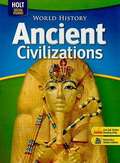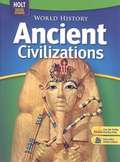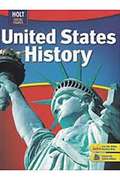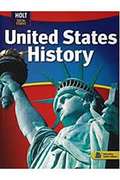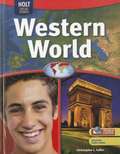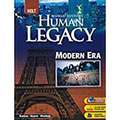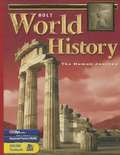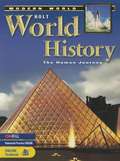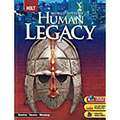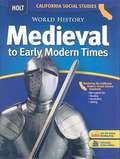- Table View
- List View
Holt Mcdougal Government: Principles in Practice
by Holt McdougalThe U.S. Constitution outlines six fundamental principles that have guided American government for more than 200 years. The Framers of the Constitution established these six principles-popular sovereignty, limited government, separation of powers, checks and balances, judicial review, and federalism-as the basis of our national government.
Holt Mcdougal World History Guided Reading Workbook Grades 6-8 Survey
by Holt McdougalMiddle School History Workbook
Holt Social Studies World History, Interactive Reader and Study Guide
by Holt Winston RinehartNIMAC-sourced textbook
Holt Social Studies: United States History
by William Deverell Deborah Gray WhiteNIMAC-sourced textbook
Holt Social Studies: World History
by Richard Shek Stanley M. BursteinStudying world history will be easy for students using this textbook. With the easy-to-use structure and special features, this textbook will make history come alive for the students.
Holt Social Studies: World History (Oklahoma Edition)
by Richard Shek Stanley M. BursteinFor students to understand history better World History Oklahoma Edition covers history in two different sources: primary and secondary.
Holt Social Studies: World History, Ancient Civilizations
by Richard Shek Stanley M. BursteinIn addition to the main text, this edition includes a 7-page Economics Handbook and a 54-page Reference Section.
Holt Social Studies: World History, Ancient Civilizations
by Richard Shek Stanley M. BursteinThe book equips one to be able to analyze historical materials, dig into history to create a richer understanding of the mysteries of the past.
Holt Social Studies: World History, Ancient Civilizations
by Richard Shek Stanley M. BursteinThis book will help students read, think and solve problems like historians.
Holt Social Studies: World History, Ancient Civilizations Interactive Reader and Study Guide
by Holt Rinehart WinstonHistory is the study of the past. Historians are people who study history. Historians want to know how people lived and why they did the things they did. They try to learn about the problems people faced and how they found solutions. They are interested in how people lived their daily lives. They study the past to understand people's culture.
Holt United States History
by William Deverell Deborah Gray WhiteStudents will learn history from different types of sources, mainly primary and secondary sources.
Holt United States History and New York State History
by William Deverell Deborah Gray WhiteThe 2009 Student Edition of the popular US History text.
Holt Western World
by Christopher L. SalterThis book is all about geography and history of the Western world along with test taking strategies.
Holt World History
by Richard Shek Stanley BursteinThis textbook uses both primary and secondary sources to make students better historians.
Holt World History, Human Legacy: Modern Era
by Susan Elizabeth Ramirez Peter Stearns Sam Wineburg Steven A. GoldbergNIMAC-sourced textbook
Holt World History, The Human Journey
by Holt Rinehart WinstonAll you need to do is watch of read the news to see history unfolding. How many news stories do you see or hear about ordinary people doing extraordinary things? The Why It Matters Today feature beginning every section of the Human Journey invites you to use the vast resources of CNNfyi.com or other current event source to examine the links between past and present. Through this feature you will be able to draw connections between what you are studying in your history book and the events are taking place in out world today.
Holt World History, the Human Journey: Ancient World
by Holt Rinehart WinstonHolt World History shows the relation between geography and history.
Holt World History, the Human Journey: Modern World
by Holt Rinehart WinstonHistory and geography share many elements. History describes important events that have taken place from ancient times until the present day. Geography describes how physical environments affect human events. It also examines how people's actions influence the environment around them. One way to look at geography is to identify essential elements of its study.
Holt World History, the Human Journey: Modern World
by Holt Rinehart WinstonThroughout The Human Journey, you are asked to think critically about the events and issues that have shaped world history. Critical thinking is the reasoned judgment of information and ideas. The development of critical thinking skills is essential to effective citizenship. Such skills empower you to exercise your civic rights and responsibilities. Helping you develop critical thinking skills is an important goal of The Human Journey. The following critical thinking skills appear in the section reviews and chapter reviews of the book.
Holt World History: Human Legacy (Grades 9-12)
by Susan Elizabeth Ramirez Peter Stearns Sam Wineburg Steven A. GoldbergHolt World History: Human Legacy was created to make the study of world history an enjoyable, meaningful experience.
Holt World History: Medieval to Early Modern Times (Calfornia Social Studies)
by Richard Shek Stanley M. BursteinHistory textbook for California students.
